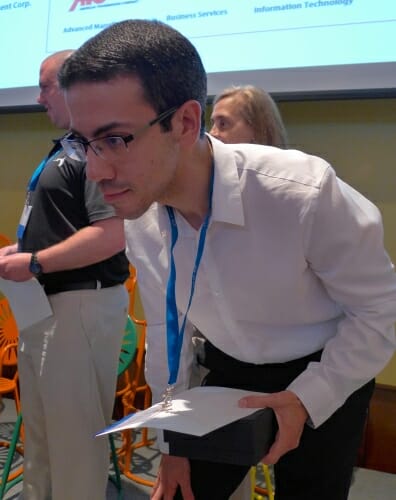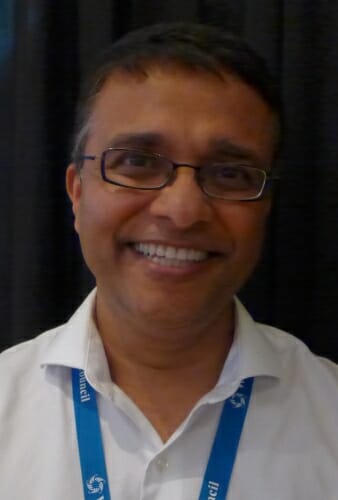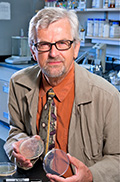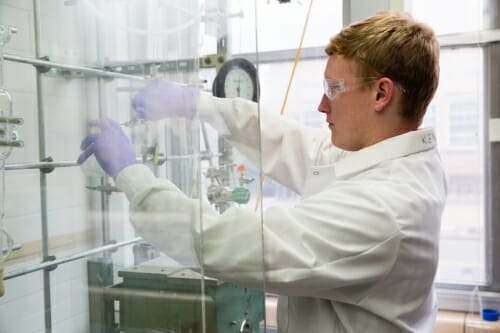UW spinoffs win awards, including top honor, at Governor’s Business Plan Contest

This school for orphans in Mboka Paul, Democratic Republic of Congo, now has a solar lighting system, donated by NovoMoto. In blue shirts are co-founder Aaron Olson (left) and his brother, Alex Olson. Photo courtesy of NovoMoto
A University of Wisconsin–Madison spinoff won the grand prize and three others won top awards in their categories in the 15th annual Governor’s Business Plan Contest on Wednesday.
The grand prize went to NovoMoto, a social enterprise company that packages and sells solar lighting systems under an innovative rent-to-own program in the Democratic Republic of Congo. The lights replace expensive kerosene lighting, said co-founder Mehrdad Arjmand in accepting the award.
NovoMoto also snagged the business services category award.

Mehrdad Arjmand, co-founder of NovoMoto, celebrates winning the grand prize at the 2018 Governor’s Business Plan Contest. Photo: David Tenenbaum
The contest was organized by the Wisconsin Technology Council and sponsored by a wide range of public interest groups, technology businesses and providers of services to entrepreneurs.
The contest began by winnowing 196 entries from 56 Wisconsin communities to 12 finalists, who gave seven-minute pitches on Tuesday at the Wisconsin Entrepreneurs’ Conference on the UW–Madison campus.
“We are pleased, happy,” said Arjmand, who recently earned a Ph.D. from the UW in engineering mechanics. “NovoMoto provides electricity to off-grid communities in Africa by providing solar lighting systems. They are now using kerosene, and that’s unhealthy and dangerous. We help them pay for the system in small installments. People in rural Africa cannot afford $100 or $200 (up front) for a system.” After a buyer pays the $2.15 per week payment, they receive a text with a code to unlock the system for another week. “After three years, they own the system,” Mehrdad says.
Three other businesses rooted at UW–Madison were also recognized at the contest:
-
DataChat, a spinoff by computer science professor Jignesh Patel, won the information technology award. DataChat has created an intelligent interface that allows data-heavy businesses and organizations to ask plain-English questions, such as, “What is the trend in productivity of my sales force over the last year?” or “Which properties have seen the greatest appreciation in the last 18 months, and why?” Said Patel, who has started and sold several other computer science companies, “Data is the new oxygen, and businesses can’t afford to throw out data. But most companies extract a small fraction of potential value from their data.”
-
AmebaGone, a spinoff from Professor of Bacteriology Marcin Filutowicz, is developing biological controls for bacteria that destroy apple and potato crops. Their biological agent, called a dictyostelid (dicty), can be sprayed onto foliage, where it proceeds to devour bacteria. Once the bacteria are consumed, the organism goes dormant but remains ready to eat further bacteria if present. After obtaining federal and state registration, AmebaGone expects to reach the market in 2019 or 2020, said agricultural lead scientist Amy Jancewicz, who has a UW–Madison Ph.D. in cell and molecular biology. “We want to harness the power of dictys to increase yield and food security worldwide.” The firm benefits from the expertise of UW–Madison professors Patricia McManus and Amanda Gevens. McManus is a specialist in diseases of fruit trees, and Gevens in diseases of vegetables, including potatoes.
-
Pyran won second place in the advanced manufacturing category for a patented method to convert biomass into a chemical widely used in paints and plastics, as well as the “Bright Idea Award.” Co-founder Kevin Barnett, who obtained a Ph.D. at UW–Madison under the direction of chemical engineering professor George Huber, noted that the chemical is usually sourced from crude oil. “We are the only source of renewable 1,5-Pentanediol and we already have interest from some big users.”
Tags: awards, business, state relations



